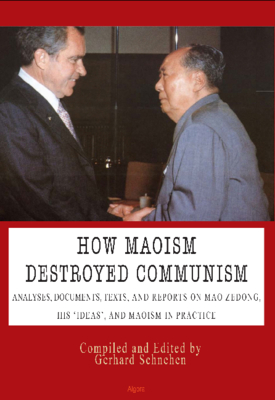Mao is remembered as one of history's most outstanding leaders, but his legacy shows that he betrayed al the principles he claimed to represent. Just consider these questions:
1. In general, Mao Zedong is considered to be a âMarxistâ. If this was true, then why did he purge the Marxists Gao Gang and Rao Shushi from the Communist Party and put them behind bars? Gao had taken part in the liberation of China before the proclamation of the Peopleâs Republic in 1949 and was a widely renowned Communist.
2. âMao Zedong Thoughtâ is usually described by Maoists as a further development of Marxism-Leninism. If this was really so, then why did Mao Zedong propagate building socialism by prioritizing agriculture and light industry over heavy industry? According to Marxist Political Economy, in the first stages of socialism heavy industry must be prioritized to equip agriculture with modern and labor-saving machinery.
3. In the late fifties Mao Zedong, without asking his own Party, introduced the Peoplesâ Communes. At the same time, the Chinese peasants were forced to smelt iron in tiny home-made backyard furnaces. Later he recommended shooting sparrows to protect the grain harvest. Would a normal person, or a reasonable Marxist leader, order the people to do such things?
4. Mao Zedong launched the Great Leap Forward in 1958, causing nationwide famine. Millions of people died from exhaustion and hunger. His fiercest critic, Defense Minister Peng Dehuai, was punished for having criticized him and lost all his party posts. Why wasnât Mao himself, who was chiefly responsible for the catastrophe, not punished and expelled from the Communist Party?
5. In 1966 Mao Zedong supported the âRed Guardsâ. He tied a red armband around his arm to show his solidarity with them. These âRed Guardsâ torched libraries and books like the German Nazis did, smashed Buddhist statutes, desecrated cemeteries, plundered museums, and demolished old statues and scriptures, thus destroying large parts of the Chinese cultural and intellectual heritage. Mao Zedong did not rein them in but let it happen. Lenin had said that the cultural heritage must be respected and preserved by Communists, as such people are no Anarchists but highly cultured people. How could the âMarxist-Leninistâ Mao Zedong act in such a way?
6. Mao Zedong, as we all know, tolerated an excessive personality cult around his person, especially during the âCultural Revolutionâ. His supporters, among them Lin Biao, then Chinese Defense Minister, whipped it up in a way never known before. In the First International (mid 19th century), the International Workers Association, of which Karl Marx was a leading member, he rejected in harsh terms endeavors to glorify him. He did not tolerate a personality cult around his person. If Mao was a real Marxist-Leninist, then why did he tolerate the cult?
7. After President Richard Nixonâs and Secretary of State Henry Kissingerâs visit to Beijing in 1972, Mao Zedong supported the US foreign policy worldwide and considered himself an ally of the United States. He recognized the military bases of the US in Asia, in Europe and elsewhere and stopped sending weapons to the Vietnamese people fighting the imperialists. He even gave a substantial loan to the fascist Pinochet regime in Latin America; he also recognized the fascist regime in Spain, the Franco regime. Marxists are anti-imperialists and wholeheartedly support national liberation movements. Why did Mao Zedong act in this way if he was a âMarxistâ?
8. Letâs look into Mao Zedongâs past: He was never arrested by Chinese reaction in his whole lifetime. Stalin was arrested six times by the czarist police and spent years in prison and labor camps. In the Special Area in Yenan in the 1940s, Mao Zedong and his people were given weapons and supplies by the US army. Freedom fighters such as Salvador Allende of Chile (ousted and murdered by the CIA in 1973) and Patrice Lumumba of the independent Congo (ousted and murdered by the CIA in 1960) were not given weapons but were killed. Why did the US support Mao Zedong if he was a freedom fighter, a âservant of his peopleâ and also a Marxist?
9. If Mao Zedong was really a Marxist, how could he tell Foreign Minister Henry Kissinger in the early seventies that he thought of himself as âa successor of the Chinese emperorsâ? Marxists despise emperors, kings, queens, and feudal lords as they live at the expense of the working people, enslaving and exploiting them.
10. In the sixties Mao Zedong told the Indian Prime Minister Nehru that he did not fear the A-bomb because if such a bomb was dropped over China and killed 300 million people, there would still be another 300 million to survive [something no other nation could claim]. The A-bomb was a âpaper tigerâ in his view. Marxists are friends of the people; they fight for their rights and freedoms, they fight for nuclear free zones. They want peace and do everything possible to preserve it. If Mao Zedong was a Marxist, why did he say such a thing?












